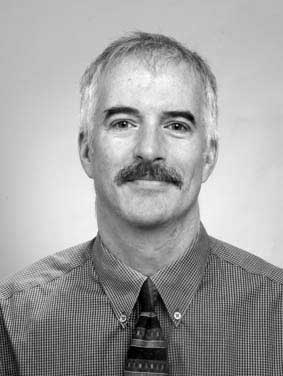Investigators
Principal investigator
Dr Jon Harrington
 Dr Jon Harrington (PhD, Imperial College London, 1997) is facility leader for fluid processes research in BGS, responsible for five laboratory sections encompassing state-of-the-art facilities for multi-phase flow, hydrate kinetics, fluid rock interactions, geomicrobiology and gas monitoring. Since joining BGS in 1992, his research has focussed on the fundamental mechanisms and processes governing multi-phase and coupled flow phenomena in low permeability materials, with particular emphasis on the underground disposal of radioactive waste and carbon capture and storage (CCS). Harrington is a senior research scientist within BGS, and has developed a detailed knowledge of the transport and mechanical properties of low permeability materials and extensive experience in research-quality testing. He manages a wide portfolio of science within BGS for national and international clients, serves on the Steering Committee of the EC-FP7 FORGE Project and is WP Leader for disturbed host rock formations.
Dr Jon Harrington (PhD, Imperial College London, 1997) is facility leader for fluid processes research in BGS, responsible for five laboratory sections encompassing state-of-the-art facilities for multi-phase flow, hydrate kinetics, fluid rock interactions, geomicrobiology and gas monitoring. Since joining BGS in 1992, his research has focussed on the fundamental mechanisms and processes governing multi-phase and coupled flow phenomena in low permeability materials, with particular emphasis on the underground disposal of radioactive waste and carbon capture and storage (CCS). Harrington is a senior research scientist within BGS, and has developed a detailed knowledge of the transport and mechanical properties of low permeability materials and extensive experience in research-quality testing. He manages a wide portfolio of science within BGS for national and international clients, serves on the Steering Committee of the EC-FP7 FORGE Project and is WP Leader for disturbed host rock formations.
Co-investigators
Professor Robert W Zimmerman
 Professor Robert W Zimmerman (PhD, University of California at Berkeley, 1984) is professor of rock mechanics at Imperial College. He is author of the monograph Compressibility of Sandstones (Elsevier, 1991), and co-author, with J C Jaeger and N G W Cook, of the fourth edition of the classic monograph Fundamentals of Rock Mechanics (Wiley-Blackwell, 2007). He is editor-in-chief of the International Journal of Rock Mechanics and Mining Sciences, and is on the editorial board of the journal Transport in Porous Media. His experience in geological repository science includes ten years as researcher and PI on the US DoE's Yucca Mountain Project. He received the 2010 Maurice A. Biot Medal for Poromechanics from the American Society of Civil Engineers. His research has been funded by NERC, EPSRC, NDA, the European Commission, BP, Chevron, Shell, Halliburton, Schlumberger and Rio Tinto, among others. He is currently a PI on the EC-funded TRUST project, "High resolution monitoring, real time visualiation and reliable modeling of highly controlled, intermediate and up-scalable size pilot injection tests of underground storage of CO2".
Professor Robert W Zimmerman (PhD, University of California at Berkeley, 1984) is professor of rock mechanics at Imperial College. He is author of the monograph Compressibility of Sandstones (Elsevier, 1991), and co-author, with J C Jaeger and N G W Cook, of the fourth edition of the classic monograph Fundamentals of Rock Mechanics (Wiley-Blackwell, 2007). He is editor-in-chief of the International Journal of Rock Mechanics and Mining Sciences, and is on the editorial board of the journal Transport in Porous Media. His experience in geological repository science includes ten years as researcher and PI on the US DoE's Yucca Mountain Project. He received the 2010 Maurice A. Biot Medal for Poromechanics from the American Society of Civil Engineers. His research has been funded by NERC, EPSRC, NDA, the European Commission, BP, Chevron, Shell, Halliburton, Schlumberger and Rio Tinto, among others. He is currently a PI on the EC-funded TRUST project, "High resolution monitoring, real time visualiation and reliable modeling of highly controlled, intermediate and up-scalable size pilot injection tests of underground storage of CO2".
Dr Adriana Paluszny
 Dr Adriana Paluszny (PhD, Imperial College London, 2008) has over nine years of academic and industrial experience as a scientific developer, of which six are in fracture mechanics of geomaterials. Since 2009, she has been a research associate at IC, developing new methods to model fracture and fragmentation in rock masses using in-house numerical modelling tools. She conducts research in simulation of fracture growth, generation of topological and geometrically realistic fracture patterns, flow in fractured porous media and fragmentation in the context of petroleum engineering and mining. She is the lead researcher on the rock fracture and fragmentation project within the Rio Tinto Centre for Advanced Mineral Recovery at IC. Her core expertise includes numerical methods, computational geometry, scientific visualisation, object-oriented software development and applied mathematics.
Dr Adriana Paluszny (PhD, Imperial College London, 2008) has over nine years of academic and industrial experience as a scientific developer, of which six are in fracture mechanics of geomaterials. Since 2009, she has been a research associate at IC, developing new methods to model fracture and fragmentation in rock masses using in-house numerical modelling tools. She conducts research in simulation of fracture growth, generation of topological and geometrically realistic fracture patterns, flow in fractured porous media and fragmentation in the context of petroleum engineering and mining. She is the lead researcher on the rock fracture and fragmentation project within the Rio Tinto Centre for Advanced Mineral Recovery at IC. Her core expertise includes numerical methods, computational geometry, scientific visualisation, object-oriented software development and applied mathematics.
Dr Lorraine Whitmarsh
 Dr Lorraine Whitmarsh (PhD, University of Bath, 2005) is a senior lecturer in environmental psychology at Cardiff University and research fellow of the Tyndall Centre for Climate Change Research. She also sits on the Climate Change Commission for Wales and edits the international review journal WIREs: Climate Change. She has been a section member of the British Science Association for over nine years. Her research employs qualitative, deliberative, survey and experimental methods to examine energy behaviour and perceptions of energy technologies and environmental risks. Projects include two UK Energy Research Centre projects on public acceptance of energy system transformation and smart grids, Research Council synthesis on public engagement with low-carbon energy policies and technologies (including CCS), FP7 REACT project on attitudes to low-carbon transport, DEFRA projects on energy habits and changing energy consumption behaviours and Welsh Government projects on sustainable behaviours and communication. She is currently leading research on public perceptions of CCS as part of a Bristol-led NERC partnership grant on CCS at In Salah (Algeria) with BP. Within her UKERC project on public acceptance of energy system performance she is developing novel experimental and deliberative methods to understand which technologies and policies the public finds acceptable within the context of whole energy system (ie supply and demand side) transformation.
Dr Lorraine Whitmarsh (PhD, University of Bath, 2005) is a senior lecturer in environmental psychology at Cardiff University and research fellow of the Tyndall Centre for Climate Change Research. She also sits on the Climate Change Commission for Wales and edits the international review journal WIREs: Climate Change. She has been a section member of the British Science Association for over nine years. Her research employs qualitative, deliberative, survey and experimental methods to examine energy behaviour and perceptions of energy technologies and environmental risks. Projects include two UK Energy Research Centre projects on public acceptance of energy system transformation and smart grids, Research Council synthesis on public engagement with low-carbon energy policies and technologies (including CCS), FP7 REACT project on attitudes to low-carbon transport, DEFRA projects on energy habits and changing energy consumption behaviours and Welsh Government projects on sustainable behaviours and communication. She is currently leading research on public perceptions of CCS as part of a Bristol-led NERC partnership grant on CCS at In Salah (Algeria) with BP. Within her UKERC project on public acceptance of energy system performance she is developing novel experimental and deliberative methods to understand which technologies and policies the public finds acceptable within the context of whole energy system (ie supply and demand side) transformation.
Dr Caroline Graham
 Dr Caroline Graham (PhD, University of Edinburgh, 2010) is a geomechanics specialist, working in BGS's state-of-the-art Transport Properties Research Laboratory since 2009. Her primary focus is on conducting multi-phase fluid flow experiments on natural and engineered low permeability materials for geological storage applications. Current research includes hydraulic, consolidation and gas flow testing of both bentonite and candidate radioactive waste repository host-rock/engineered material (EC FORGE) and determination of seal transport properties for CCS (DECC Green River Project, FP7 ULTimateCO2). She is also involved in a test programme on this topic as part of BGS's ongoing CCS research programme in collaboration with the Geological Survey of Ireland. In March 2012, she was part of a UK delegation to China on geological disposal of radioactive waste (BIS Global Partnership Scheme). She is also a member of GeoRepNet, a recently funded STFC network, established to encourage collaboration within the geological repositories (both CO2 and radioactive waste) research community.
Dr Caroline Graham (PhD, University of Edinburgh, 2010) is a geomechanics specialist, working in BGS's state-of-the-art Transport Properties Research Laboratory since 2009. Her primary focus is on conducting multi-phase fluid flow experiments on natural and engineered low permeability materials for geological storage applications. Current research includes hydraulic, consolidation and gas flow testing of both bentonite and candidate radioactive waste repository host-rock/engineered material (EC FORGE) and determination of seal transport properties for CCS (DECC Green River Project, FP7 ULTimateCO2). She is also involved in a test programme on this topic as part of BGS's ongoing CCS research programme in collaboration with the Geological Survey of Ireland. In March 2012, she was part of a UK delegation to China on geological disposal of radioactive waste (BIS Global Partnership Scheme). She is also a member of GeoRepNet, a recently funded STFC network, established to encourage collaboration within the geological repositories (both CO2 and radioactive waste) research community.
Researchers
Dr Robert Cuss
 Dr Robert Cuss (PhD, University of Manchester, 1999) is a geomechanics and fracture flow researcher and laboratory manager of the Fracture Physics Laboratory, part of Fluid Processes Research at the BGS. Since joining in 1999 his primary role has been in researching the interplay of mechanics with fluid flow in intact and fractured low-permeability clay rich rocks. This applied research has been conducted on targeted research questions related to radioactive waste disposal, carbon capture & storage, underground gas storage, unconventional hydrocarbons (shale gas), and conventional hydrocarbons. His research has predominantly been conducted on clay-rich geological materials, including bentonite, Callovo-Oxfordian Claystone, Opalinus Clay, Bowland Shale, and pure clays; in addition, research has been conducted on sandstone and rock salt. He has participated in 7 major European Commission research projects, including NF-Pro, FORGE, Co2GeoNet, UltimateCO2, M4ShaleGas, Eccell, and EPOS. He is an author of 26 peer-review papers, 1 book chapter, 86 conference papers, and 57 BGS Reports.
Dr Robert Cuss (PhD, University of Manchester, 1999) is a geomechanics and fracture flow researcher and laboratory manager of the Fracture Physics Laboratory, part of Fluid Processes Research at the BGS. Since joining in 1999 his primary role has been in researching the interplay of mechanics with fluid flow in intact and fractured low-permeability clay rich rocks. This applied research has been conducted on targeted research questions related to radioactive waste disposal, carbon capture & storage, underground gas storage, unconventional hydrocarbons (shale gas), and conventional hydrocarbons. His research has predominantly been conducted on clay-rich geological materials, including bentonite, Callovo-Oxfordian Claystone, Opalinus Clay, Bowland Shale, and pure clays; in addition, research has been conducted on sandstone and rock salt. He has participated in 7 major European Commission research projects, including NF-Pro, FORGE, Co2GeoNet, UltimateCO2, M4ShaleGas, Eccell, and EPOS. He is an author of 26 peer-review papers, 1 book chapter, 86 conference papers, and 57 BGS Reports.
Toni Milodowski
 Antoni (Tony) Milodowski is a Principal Petrologist working mainly within the Minerals and Waste Directorate (Radioactive Waste Team and Renewables, Energy Storage and Clean Coal Team) and Environmental Modelling Directorate. He is a specialist in low-temperature hydrothermal and rock-water interaction processes, and in petrology of fractured rock systems. Tony's research interests and expertise are focussed on sedimentary petrology and diagenesis, reservoir and caprock characterisation in relation to fluid flow and pore system evolution, palaeohydrogeology, behaviour of cement systems in the geological environment, uranium and rare earth element geochemistry, radionuclide migration in natural systems, and borehole sealing. He leads BGS research on cement-rock interaction and is the principal BGS Co-Investigator on the NERC-funded BIGRAD Project, and is a Co-Investigator leading laboratory experimental studies on compressed air energy storage (CAES) for the EPSRC-funded IMAGES Project. Tony is also the project manager for the BGS Permo-Triassic Reservoirs and Storage Project (PTReS).
Antoni (Tony) Milodowski is a Principal Petrologist working mainly within the Minerals and Waste Directorate (Radioactive Waste Team and Renewables, Energy Storage and Clean Coal Team) and Environmental Modelling Directorate. He is a specialist in low-temperature hydrothermal and rock-water interaction processes, and in petrology of fractured rock systems. Tony's research interests and expertise are focussed on sedimentary petrology and diagenesis, reservoir and caprock characterisation in relation to fluid flow and pore system evolution, palaeohydrogeology, behaviour of cement systems in the geological environment, uranium and rare earth element geochemistry, radionuclide migration in natural systems, and borehole sealing. He leads BGS research on cement-rock interaction and is the principal BGS Co-Investigator on the NERC-funded BIGRAD Project, and is a Co-Investigator leading laboratory experimental studies on compressed air energy storage (CAES) for the EPSRC-funded IMAGES Project. Tony is also the project manager for the BGS Permo-Triassic Reservoirs and Storage Project (PTReS).
Dan Parkes
 Dan Parkes is a mineralogist and petrologist with the BGS Radwaste Team. His main area of interest lies in environmental mineralogy with current and past research projects focused on a diverse range of subjects including sandstone diagenesis for CCS and cement alteration for the radioactive waste industry. For CONTAIN he has been tasked with preparing a number of literature reviews focusing on the physical and mineralogical properties of both the target Cretaceous and Permo-Triass reservoir and cap rocks.
Dan Parkes is a mineralogist and petrologist with the BGS Radwaste Team. His main area of interest lies in environmental mineralogy with current and past research projects focused on a diverse range of subjects including sandstone diagenesis for CCS and cement alteration for the radioactive waste industry. For CONTAIN he has been tasked with preparing a number of literature reviews focusing on the physical and mineralogical properties of both the target Cretaceous and Permo-Triass reservoir and cap rocks.
Dr Dimitrios Xenias

Dr Dimitrios Xenias is a social psychologist with wide-ranging expertise in social attitudes and behaviour, particularly in relation to new technologies and the environment. He has previously worked in projects investigating sustainable behaviours, specifically energy use and attitudes to energy systems transitions and new technologies (e.g. renewable energy, electric vehicles). He approaches these topics using quantitative and qualitative methods, in experimental and field settings.
Dimitrios is a Research Affiliate of the Sustainable Places Research Institute at Cardiff University, the Tyndall Centre for Climate Change Research.
Within CONTAIN, Dimitrios is involved in WP3 (societal understanding and acceptance of CCS).
Email: xeniasd@cardiff.ac.uk
Twitter: @d_xenias

